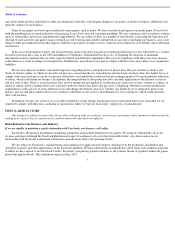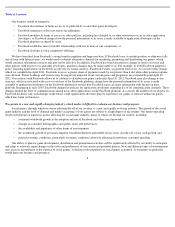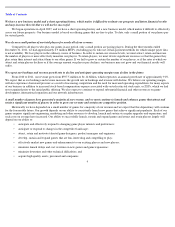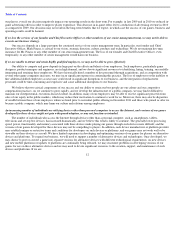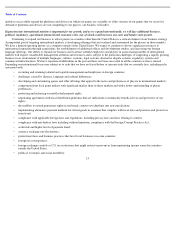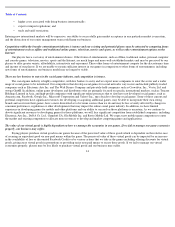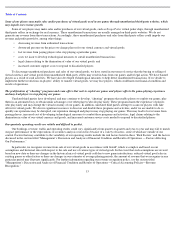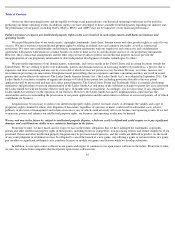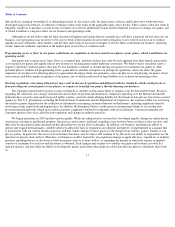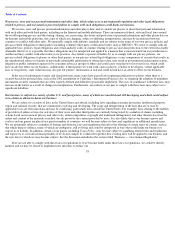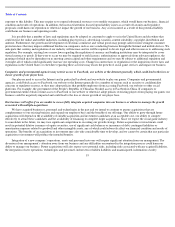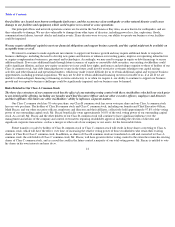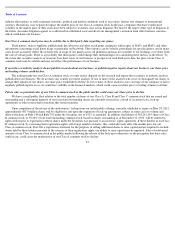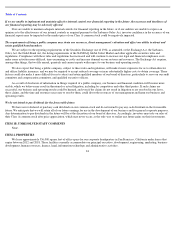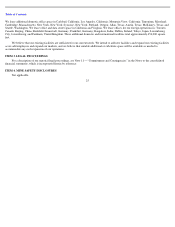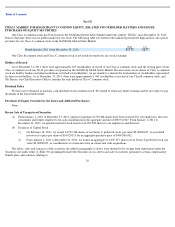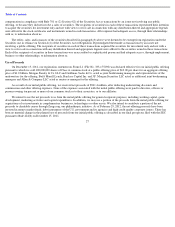Zynga 2011 Annual Report Download - page 21
Download and view the complete annual report
Please find page 21 of the 2011 Zynga annual report below. You can navigate through the pages in the report by either clicking on the pages listed below, or by using the keyword search tool below to find specific information within the annual report.
Table of Contents
their products, claiming ownership of, or demanding release of, the source code, the open source software and/or derivative works that were
developed using such software, or otherwise seeking to enforce the terms of the applicable open source license. These claims could also result in
litigation, require us to purchase a costly license or require us to devote additional research and development resources to change our games, any
of which would have a negative effect on our business and operating results.
Although we do not believe that the final outcome of litigation and claims that we currently face will have a material adverse effect on our
business, our expectations may not prove to be correct. Even if these matters do not result in litigation or are resolved in our favor or without
significant cash settlements, these matters, and the time and resources necessary to litigate or resolve them, could harm our business, operating
results, financial condition, reputation or the market price of our Class A common stock.
Programming errors or flaws in our games could harm our reputation or decrease market acceptance of our games, which would harm our
operating results.
Our games may contain errors, bugs, flaws or corrupted data, and these defects may only become apparent after their launch, particularly
as we launch new games and rapidly release new features to existing games under tight time constraints. We believe that if our players have a
negative experience with our games, they may be less inclined to continue or resume playing our games or recommend our games to other
potential players. Undetected programming errors, game defects and data corruption can disrupt our operations, adversely affect the game
experience of our players by allowing players to gain unfair advantage, harm our reputation, cause our players to stop playing our games, divert
our resources and delay market acceptance of our games, any of which could result in legal liability to us or harm our operating results.
Evolving regulations concerning data privacy may result in increased regulation and different industry standards, which could prevent us
from providing our current games to our players, or require us to modify our games, thereby harming our business.
The regulatory framework for privacy issues worldwide is currently in flux and is likely to remain so for the foreseeable future. Practices
regarding the collection, use, storage, transmission and security of personal information by companies operating over the Internet and mobile
platforms have recently come under increased public scrutiny, and civil claims alleging liability for the breach of data privacy have been asserted
against us. The U.S. government, including the Federal Trade Commission and the Department of Commerce, has announced that it is reviewing
the need for greater regulation for the collection of information concerning consumer behavior on the Internet, including regulation aimed at
restricting certain targeted advertising practices. In addition, the European Union is in the process of proposing reforms to its existing data
protection legal framework, which may result in a greater compliance burden for companies with users in Europe. Various government and
consumer agencies have also called for new regulation and changes in industry practices.
We began operations in 2007 and have grown rapidly. While our administrative systems have developed rapidly, during our earlier history
our practices relating to intellectual property, data privacy and security, and legal compliance may not have been as robust as they are now, and
there may be unasserted claims arising from this period that we are not able to anticipate. In addition, our business, including our ability to
operate and expand internationally, could be adversely affected if laws or regulations are adopted, interpreted, or implemented in a manner that
is inconsistent with our current business practices and that require changes to these practices, the design of our website, games, features or our
privacy policy. In particular, the success of our business has been, and we expect will continue to be, driven by our ability to responsibly use the
data that our players share with us. Therefore, our business could be harmed by any significant change to applicable laws, regulations or industry
practices regarding the use or disclosure of data our players choose to share with us, or regarding the manner in which the express or implied
consent of consumers for such use and disclosure is obtained. Such changes may require us to modify our games and features, possibly in a
material manner, and may limit our ability to develop new games and features that make use of the data that our players voluntarily share with
us.
17


